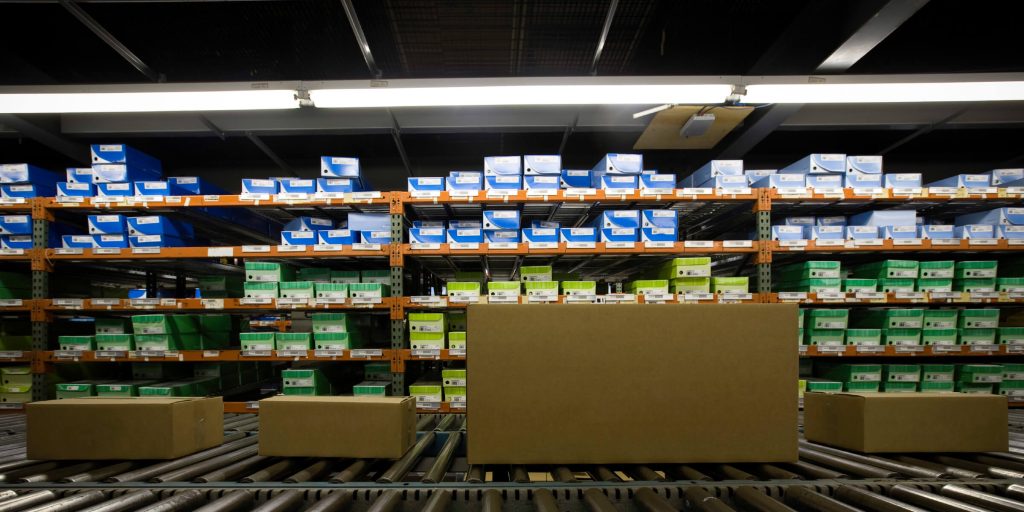3 drivers shaping the future of B2B manufacturing sales
February 20, 2023Business as usual is over. Explore the key drivers shaping the future of B2B manufacturing sales.
The last few years have kept manufacturers on their toes. From supply chain disruptions and material shortages to inflation and the pandemic, “business as usual” feels like a distant memory. But these shifts are forcing companies to make long-overdue improvements and revealing promising new opportunities.
To help you stay one step ahead of the competition, we’ve identified three key drivers currently shaping the future of manufacturing sales:
> Skyrocketing buyer expectations
> Increasing demands for sustainable transparency
> Growing opportunities in after-sales and service
Read on to find out how you can use this changing landscape to your advantage.
Buyer expectations are skyrocketing
E-commerce expectations aren’t new. For years, B2C shoppers have enjoyed the convenience of product comparisons, single-click ordering, and same-day delivery. But now these B2C expectations are spreading, with B2B buyers looking for that same shopping experience from manufacturers. Here’s what that means for you:
B2B buyers are spending more online
Just before the pandemic, eMarketer found only 9% of B2B product sales in the US took place via e-commerce websites. But that’s changing fast. Forrester predicts online channels will account for 17% of US B2B sales in 2023, reaching a total of $1.8 trillion. Manufacturers who prioritize online channels will be well placed to take advantage.

They’re jumping between channels…
Whether researching, ordering, or looking into product returns, today’s B2B buyers are moving between channels to ensure they get the best product for them. A Salesforce study revealed buyers use an average of 9 different channels when interacting with a single company, highlighting the need to deliver a seamless omnichannel experience to boost loyalty and sales at the same time.
… because they want a personal experience
B2B buyers want recommendations based on their specific needs and interests. But they aren’t calling sales reps for advice. According to McKinsey, 66% of buyers now prefer remote human interactions or digital self-service. The takeaway? Use product data and AI to create customized product ecosystems, giving buyers personalized experiences without the need for an actual person.
Sustainability is here to stay
The call for sustainability gets louder every year, and the issue is now permanently on the manufacturing agenda. Consumers may have started this call for greater transparency, but demands are now coming from legislators and manufacturers themselves. Sustainability is no longer a nice-to-have, it’s a required minimum, and that has implications for you:
The future is circular
The linear make > use > dispose era is over. Manufacturers and consumers are moving towards a circular economy in which products and materials are endlessly recycled and reused. This will require a massive upheaval in how things are made, but manufacturers who get ahead of the curve will be well-placed to cash in on these shifts.
New regulations are pushing change…
The EU is leading the sustainability charge with a new Digital Product Passport (DPP) legislative initiative – a digital product record that captures important details at every step of the supply chain. It will require manufacturers to disclose a huge range of environmental and social data for every single product. To reduce legal risks, manufacturers will need full compliance for their entire product line.

… and so is the new generation of B2B buyer
Gen Z has the most climate-conscious consumers to date, and this generation will dominate B2B buying decisions within a decade. These future business leaders will spend with companies that have the best handle on traceability and circularity. Manufacturers who make sustainability central to their brand now – and practice what they preach – will win a loyal following in the future.
The importance of operational efficiency in B2B manufacturing
Operational efficiency is no longer a luxury but a necessity in the competitive landscape of B2B manufacturing. By adopting process automation, centralizing data, and leveraging advanced analytics, B2B manufacturing companies can streamline their operations, reduce costs, and enhance productivity. These improvements enable companies to meet heightened customer expectations, driven by the “Amazon Effect,” which demands fast, efficient service and seamless purchasing experiences. Investing in these areas not only boosts operational efficiency but also positions manufacturing businesses to respond swiftly to market changes and customer needs, ensuring long-term success in the manufacturing industry.
Service is an untapped profit-driver
In a saturated marketplace, manufacturers can’t compete on products alone. Excellent customer service is one important way to stand out. This service-oriented mindset can also increase revenue by offering customers the products, parts, and support they need, exactly when they need it. Stay ahead of the curve by:
Considering the full customer lifespan
According to Salesforce, 73% of buyers expect companies to understand their unique needs. To maximize profits, offer personal attention at every stage of the relationship. This could be recommendations during the research phase or advice during checkout. Manufacturers who go the extra mile will see greater loyalty which increases their customer lifetime value.

Expanding the product ecosystem…
Every product is part of a bigger universe. Building a clear digital ecosystem helps customers quickly find related accessories, spare parts, or personal assistance. Building these connections not only makes manufacturers’ processes more efficient, but also creates better-informed customers, resulting in fewer returns and less time, money, and inventory lost in the process.
… to tap into the after-sales market
Self-service platforms are an ideal way to continue the relationship after the first sale, by encouraging repeat orders, showcasing relevant spare parts, and even offering repair services. Focusing on your existing customers delivers major benefits, with Deloitte estimating after-sales service can increase companies’ overall revenue by 50%.
Turn these key drivers into an opportunity with product information
There’s a common thread connecting these three drivers: product information. Product information can help you create compelling multichannel experiences, meet evolving demands for sustainability data, and deliver better service at every customer touchpoint. But only if it’s managed properly. Because of this, PIM for manufacturing has become much more popular.
PIM software for B2B businesses elevates your product information management by creating a single source of truth for every single product you sell. The inriver PIM is designed to power the entire manufacturing product journey, equipping forward-thinking manufacturers with the tools to:
- Deliver high-value, personalized customer experiences
- Establish a clear product/service ecosystem
- Provide sustainable transparency across the product value chain
- Drive revenue throughout the entire customer lifecycle
To learn more about these issues, read our latest ebook: A new era of opportunity in manufacturing.
want to see the inriver PIM in action?
Schedule a personalized, guided demo with an inriver expert today to see how the inriver PIM can get more value from your product information.
you may also like…
frequently asked questions
what are the most effective marketing strategies for B2B manufacturers in today’s market?
Effective marketing strategies for B2B manufacturers involve a blend of traditional and digital approaches to reach and engage potential customers. First, leveraging market research is crucial to understand industry trends and the specific needs of your B2B customers. Creating high-quality content that addresses these needs can boost brand awareness and establish your company as an industry leader. Additionally, implementing marketing automation tools can streamline lead nurturing and lead generation processes, ensuring that your sales team focuses on the most qualified leads. Finally, integrating a robust B2B e-commerce PIM platform can enhance the purchasing experience and drive sales growth.
how can B2B manufacturers improve their brand identity to attract more potential customers?
Improving brand identity involves creating a consistent and compelling message that resonates with your B2B customers. Start by defining your unique value proposition and communicating it clearly across all marketing channels. Use market research to understand what your potential customers value most and tailor your messaging accordingly. Building a strong online presence through a well-designed website, active social media profiles, and engaging content can also enhance brand awareness. Additionally, investing in marketing automation can help deliver personalized experiences, making your brand more relatable and trustworthy to potential customers.
how can B2B marketers stay ahead of industry trends and maintain a competitive edge?
B2B marketers can stay ahead of industry trends by continuously monitoring the market and adapting their marketing strategies accordingly. Regularly attending industry conferences, subscribing to trade publications, and participating in professional networks can provide valuable insights. Implementing marketing automation tools can also help track and analyze customer behavior, allowing you to respond swiftly to changes in the market. Furthermore, investing in B2B e-commerce solutions can enhance customer engagement and satisfaction, positioning your company as a forward-thinking leader in the industry. Staying informed and agile ensures that your marketing efforts remain effective and relevant.
Powering a Sustainable Future: Notes from our CEO
inriver CEO Niels Stenfeldt explores the role technology can play in building a better future in his blog series "Powering a Sustainable Future: Notes from our CEO". He shares his thoughts on the PIM industry, its direction, the latest trends and innovations, and most importantly how brands and manufacturers can take advantage of this evolution to position themselves as market leaders.